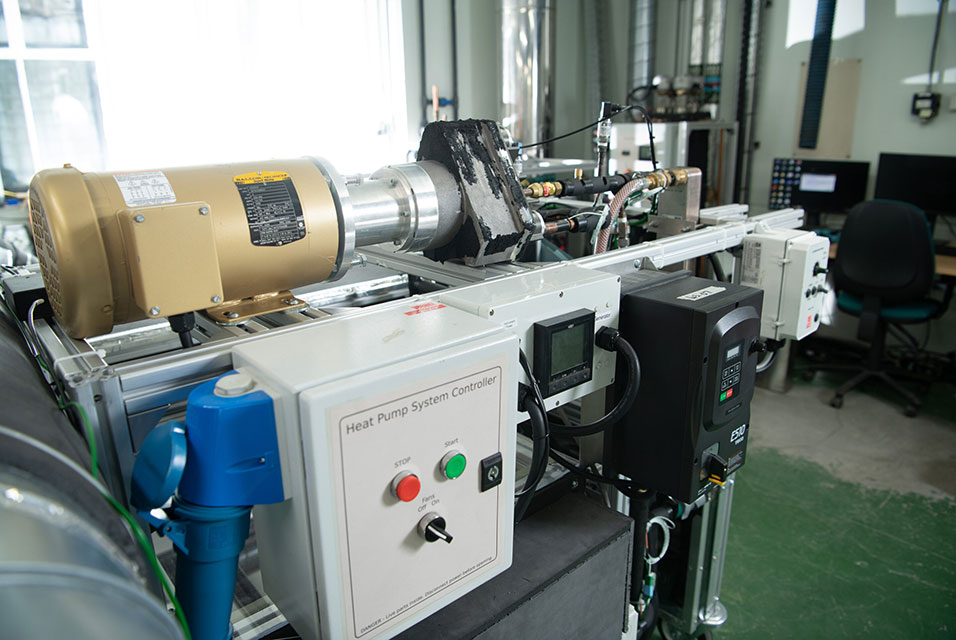GLASGOW.- Researchers from the
University of Glasgow have developed a new type of heat pump, a flexible heat pump technology, which could help households save on their energy bills and contribute towards net-zero emissions goals.
Heat pumps are a low-carbon alternative to gas boilers. They draw energy from external low temperature sources, most commonly outdoor air, in order to heat indoor spaces. When powered by renewable sources of power, they are significantly more environmentally friendly than conventional gas boilers.
Around the world, about 40% of carbon emissions come from heating powered by fossil fuels. The U.K. Government has set a target for 600,000 heat pump installations per year by 2028 in order to reduce the country's carbon footprint.
However, the heating capacity and energy efficiency of the current generation of heat pumps can be impacted by cold weather, particularly for air source heat pumps. High capital and operational costs and relatively low heat supply temperature have limited the growth of their use in the U.K. Innovations are urgently needed to improve the cost-effectiveness of heat pumps to compete with fossil-fuel-based heating technologies.
In a new paper published in the journal Communications Engineering, the researchers outline how their flexible heat pump technology provides an elegant and low-cost solution to the problems of current heat pumps by integrating heat storage—a small water tank and a coil of copper tube.
The water tank recovers some excess thermal energy produced during the pump's operation, and stores it as an additional heat source for the heat pump's operation later.
The recovered heat has a much higher temperature than the outdoor air that provides the heat source, and it can be reused as a temporary heat source, substantially reducing the pump's power consumption.
For air source heat pump applications, the recovered heat stored in the water also allows the flexible heat pump to run continuously during defrosting. That makes it more efficient and effective than the current generation of heat pumps, which interrupt the heat supply during defrosting while still consuming electricity.
The researchers have demonstrated the advantages of their new heat pump by building a working prototype using off-the-shelf components. Thorough testing against current-generation heat pump designs has shown their design to be around 3.7% more efficient than current design with a relatively low heat supply temperature of 35 °C.
When the supply temperature increases, so does the amount of energy recovered, improving the system's efficiency and saving more power. The team's analysis predicts that, after optimization, it could be up to 10% more efficient than current products when the heat supply temperature increases to 65 °C.
The team have protected their invention with a PCT patent (Reference: WO2022069581A1), and are actively looking for ways to make the flexible heat pump technology commercially available in the near future.
Zhibin Yu, Professor of Thermal Energy at the University of Glasgow's James Watt School of Engineering, led the research and development of the flexible heat pump.
He said: "We're at a critical juncture in our global move towards net-zero, where we need to start scaling up our low-carbon infrastructure quickly and effectively. That urgency is being particularly keenly felt at the moment, where energy prices are rising and many households are facing rapidly escalating bills.
"The advantages of the flexible heat pump against current heat pump products is analogous to the advantages of condensing boiler against the non-condensing boiler—both recover excess heat to greatly improve efficiency.
"Our flexible heat pump solves many of the problems with the current generation of heat pumps, making them capable of delivering improved performance while using less power. The cost of a small water tank heat storage is marginal, but the power saving is significant. It can be widely applied for all kinds of the heat pump applications. We believe that this could help drive improved takeup of heat pump technology in homes across the U.K.
"Now that we have acquired a patent on the technology and proved the concept in laboratory, we're keen to start working with manufacturers, energy suppliers and other partners to take the first steps towards putting these next-gen heat pumps into homes in Britain and around the world."
The team's paper, titled "A flexible heat pump for heat recovery," is published in Communications Engineering, a Nature portfolio journal.
Professor Yu and his team are currently seeking collaborators to take forward the development of their flexible heat pump technology.










